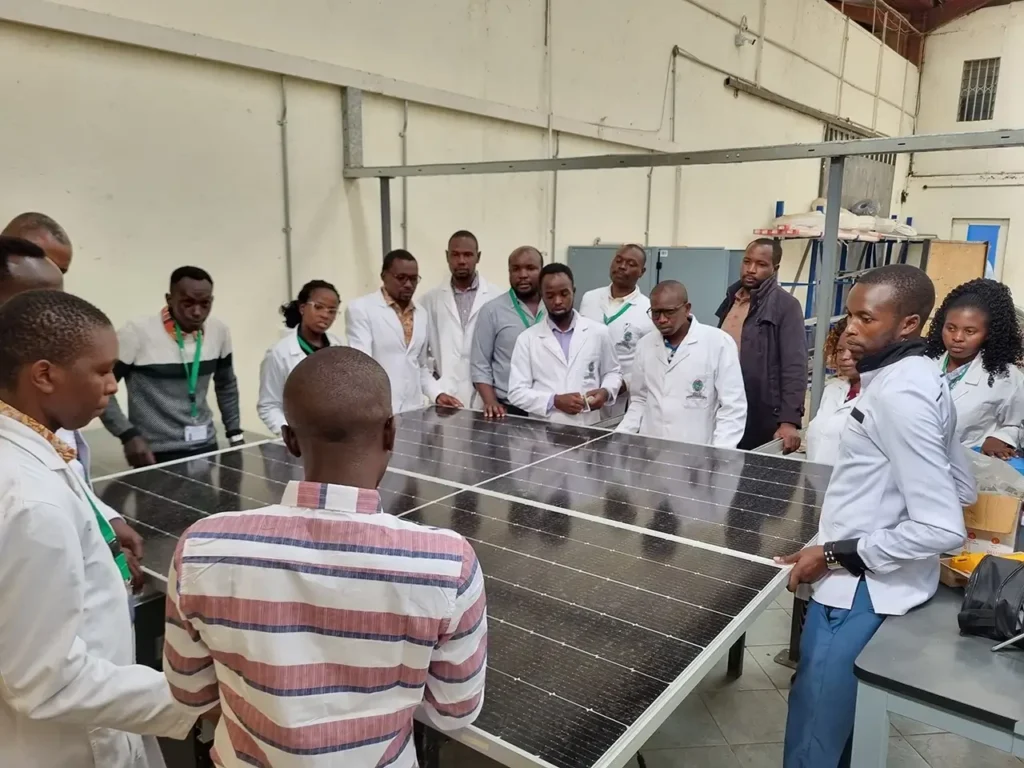What is vocational training?
Vocational training, or technical education is a form of education aiming at equipping students with specific skills for a particular profession or occupation.
Mainly vocational training focused on practical, and hands-on learning, while traditional academic paths focused on more theoretical learning. Lately, vocational training has increased in popularity in fields such as:
- Renewable Energy
- Construction
- Healthcare
- Information Technology
- Agriculture
- Hospitality
Vocational training is a powerful instrument to empower individuals and allows them to possess the necessary skills to enter the workforce with real-world abilities meeting the demands of modern employers. That is why we use vocational training in our technical courses.

How vocational training differs from traditional education
In many ways traditional education and vocational training are not the same and should not be used interchangeably. They each have their own structure with two opposite outcomes.
Traditional education focuses on the theoretical aspect of learning, such as critical thinking and academic knowledge. Consequently, vocational training has turned into a vital option for recent graduates looking for quick employment entry or wanting to upskill to foster their career growth.
Since traditional education is more theoretical, at the end of such studies when successful, students are presented with a degree, such as a Bachelor’s or Master’s, with a broad sense of knowledge leading to a wide range of careers possibilities and further academic pursuits. On the other spectrum, vocational training is more straightforward, with shorter time span; it focuses on targeted courses, at the end of such courses, students are presented with diplomas, often also calls certifications, or licenses, after a vocational training program, the student is readily available and equip for a specific field of employment.
Some of the key distinction lies:
| Traditional Education | Vocational Training |
| Focuses on theoretical knowledge | Focuses on targeted courses for job-specific, hands-on skills |
| The completion of degrees such as Bachelor’s or Master’s | The completion of in diplomas, certifications, or licenses |
| Broad range of knowledge and careers possibilities | Readily available for a specific field of employment |
| Longer programmes, such as 4 years or more | Shorter and more targeted courses of couple of weeks or months |
Types of vocational training
In the last years vocational education has greatly evolve to meet the needs of industries and learners; consequently, they have become more flexible and diverse:
Some of the different types of vocational training:
- Technical Schools: they offer in-depth courses in capacities, such as solar pv installation, automotive repair, plumbing, welding, and computer networking.
- Apprenticeship Programs: combines classroom learning with on-the-job training, these programs are conducted by experienced professionals, and they are often paid.
- Online Vocational Courses: if you are looking for flexibility, remote learning provides many options but not limited to graphic design, coding, bookkeeping, and digital marketing.
- Community Colleges: mainly to support recent college graduates, they often offer associate degrees and certifications in applied sciences and technical disciplines.
- Industry-Specific Training Centers: in many countries and sectors, these centers focus on regional economic needs like renewable energy, agribusiness, healthcare, and tourism.
Benefits of vocational training
Vocational training has proven to provide many benefits for the students, teachers, communities, and even more the economies:
Some of these advantages include:
- Job Readiness: graduates are equipped with practical skills, which in turn increase their employability.
- Economic Growth: recent studies have showed that a skilled workforce is more likely to attract local and international investment, resulting in a boost of productivity and GDP.
- Lower Unemployment: since vocational training addresses skills mismatches, having a more ready workforce also lead to more job placements.
- Career Flexibility & Entrepreneurship: the students are able to adapt to the constant changing markets; they have been an increase in the start of own businesses and startup in some of these specific fields.
- Social Inclusion: this is very impactful for the youth and marginalized communities, because vocational education promotes equity and empowerment.
Vocational training in East Africa
East Africa is at the forefront of a skills revolution and is experiencing a dynamic shift toward skills-based education. Countries like Kenya, Uganda, Tanzania, and Rwanda have been making strategic investments in vocational training to build a more competitive and ready workforce, to meet the demands of modern economies.
Key sectors seeing growth include:
- Renewable Energy
- Information & Communication Technology
- Agribusiness
- Healthcare
- Construction & Infrastructure
At the forefront of this movement are government bodies, local institutions, and nonprofit partners, including the WTS Foundation, working to expand access to quality training programs in high-demand sectors such as renewable energy. These initiatives aim to bridge the education-employment gap and provide meaningful career pathways for youth and women across the region; with continued investment and innovation, vocational training promises to unlock the region’s immense human potential.





